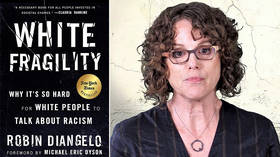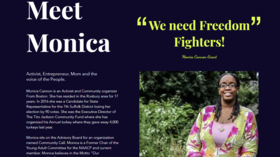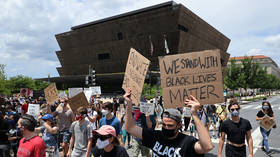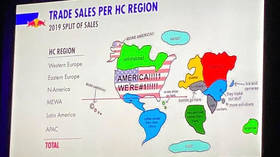‘White Fragility’ is an exhausting, dull, racially obsessed book that only serves to deepen divisions

Robin DiAngelo’s bestseller just proves that the woke intersectional left is equally unhealthily obsessed with race as the alt-right white nationalists they claim to despise.
‘White Fragility: Why It’s So Hard for White People to Talk About Racism’ has recently ensconced itself in the global zeitgeist. Despite being written in 2018, its popularity has soared this year in the wake of the killing of George Floyd and global Black Lives Matter protests-cum-riots. It is currently on both the New York Times and Amazon bestseller lists, no doubt making its author, Robin DiAngelo, a very wealthy woman.
I didn’t want to read this book; Scandinavian detective novels are more my bag to be honest, but given the prominence of it, I thought it best to see what all the fuss was about. Thus I subjected myself to this exhausting, boring read, so you don’t have to put yourself through it – or further line the pockets of Professor DiAngelo.
The book’s argument is simple: if you are white, you are a racist. There is no way out of this fact as DiAngelo says that white people denying they are racist is simply further proof that they are racist. This, she argues, is the eponymous ‘white fragility’ which is a product of white people growing up in a society which is steeped in ‘white supremacy’.
You may well have thought that white supremacy was confined to meetings of skinheads with swastika tattoos and rallies full of hooded lunatics setting fire to crosses. However, DiAngelo argues that Western society is built on white supremacy and as a result it pervades everything. Again, denying that our society is inherently racist only serves to compound and protect that white supremacy on which it is built.
Even if people of colour gain positions of power in society, such as Barack Obama, Colin Powell, or Clarence Thomas, this does nothing to make the system less racist as they “support the status quo.” DiAngelo’s claims are completely unfalsifiable and effectively make racism in the West something akin to ‘The Force’ in Star Wars.
Perplexingly, along with being unfalsifiable, they are also contradictory. For example, DiAngelo argues that white people don’t see themselves in racial terms, while simultaneously arguing that their actions preserve “white solidarity.” How can a group that doesn’t see themselves as a group express solidarity? It is also argued that white people should both not avoid talking about race and not expect black people to “educate” them about it. This again makes no sense.
However, while white people can never not be racist – DiAngelo herself says she is still racist – they can do “work” to make themselves more aware. Coincidentally, this “work” happens to be DiAngelo, who along with being a professor in “multicultural education” specialising in “whiteness studies” is also a diversity “facilitator.” This means that for a fee of between $30,000-$40,000 she will lecture you for around 90 minutes, at the end of which, if you listen very closely, you will still be racist, but more aware of it. That doesn’t exactly seem like money well spent.
The purpose of these lectures is not only to make whites aware that they are inherently racist, but also to build up their “racial stamina.” You see, racial stamina is the way to combat white fragility and, from the sounds of it, building up this stamina is a deeply unpleasant process. The book is littered with anecdotes from these lectures and seminars, all of which appear to end with someone either in tears or storming out in a rage. Although this is obviously no indication of the lectures themselves being bad or insulting, just indicative of white fragility.
The crying is a particular problem for Professor DiAngelo, particularly white women crying in front of black people. Indeed, she considers this so much of a problem that there is an entire chapter of the book titled ‘White Women’s Tears’. Her reasoning behind this is that there is a history of black men being tortured and murdered because of white women’s distress. As a white woman herself, she writes, “our tears trigger the terrorism of this history,” before citing the case of Emmett Till, a 14-year-old boy who was lynched in Mississippi in 1955 after allegedly flirting with a white woman.
This example is a perfect illustration of how DiAngelo’s warped view of the world manages to simultaneously be insulting to both white and black people. She argues not only that black men will immediately think of lynching when they see a white woman cry, but also that if they comfort the woman they are doing so not out of sympathy or concern, but because they have been conditioned by sexism and the patriarchy.
Her argument constantly seems to rob people of colour of their own agency, while impugning the motive of racism into any action by a white person. If a white person is nice to a black person, it is racist. If they are nasty to a black person, that is also racist. Saying that you were taught to treat everyone equally is not only racist but also ignorant as it shows you are unaware of your socialised racism.
To illustrate this socialised racism, the book is peppered with anecdotes designed to show that all white people are racist, but really just display DiAngelo’s own prejudices. She argues that white people come away from the story of Jackie Robinson believing he was the first black baseball player good enough to play with whites rather than the first who was allowed to. But no one with even a passing interest in the sport believes that he was simply the first black man capable of competing with whites, making her argument a total fallacy.
Elsewhere she says that white people use coded language such as “sketchy,” “urban,” or “bad neighbourhood” when what they really mean is a lot of black people live there. To demonstrate this, DiAngelo writes about a conversation she was having with a white friend who was telling her about a white couple she knew that had moved to New Orleans for $25,000. Her friend then told her that the couple had also bought a gun, at which point DiAngelo says, “I immediately knew they had bought a home in a black neighbourhood.” DiAngelo will presumably assert that all white people would make that assumption, but she cannot be sure of that. This statement is indicative her own prejudices, not a universal one.
DiAngelo’s argument is a perfect circular one, you are racist because you are white, only white people can be racist, so being racist makes you white. It is then impossible to argue against because denial is simply further proof of your racism. You can’t even argue that you just treat people as individuals because that ignores their experience as a member of a group in an inescapable intersectional power structure. Ironically, she shares the exact same view of race as the white nationalists she presumably despises.
The best example of the unfalsifiability of her argument comes when DiAngelo lists a series of phrases used by white people to claim they are not racist. This includes phrases like: “I know people of colour,” “I marched in the sixties,” “the real oppression is class,” “you don’t know me,” but the most telling one of all is, “I disagree.”
In Robin DiAngelo’s view, disagreeing with her is just proof that you are a racist. There is no room for nuance or debate, no shades of grey – to Professor DiAngelo the world is, in every sense of the phrase, black and white.
Think your friends would be interested? Share this story!
The statements, views and opinions expressed in this column are solely those of the author and do not necessarily represent those of RT.


















